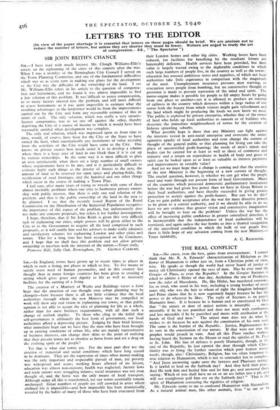LETTERS TO THE EDITOR (In view of the paper shortage
it is essential that letters on these pages should be brief. We are anxious not to reduce the number of letters, but unless they are shorter they must be fewer. Writers are urged to study the art of compression.—Ed., "The Spectator ")
SIR JOHN REITH'S CHANCE
siR,-1 have read with much interest Mr. Clough Williams-Ellis's article on the replanning of the cities of this country after the war. When I was a member of the Birmingham City Council I served on the Town Planning Committee, and one of the fundamental difficulties which met us at every turn in making our plans for the development ot thc City was the difficulty of the ownership of the land. I see M:. Williams-Ellis refers in his article to the question of compensa- tion and betterment, and we found it was almost impossible to find a fair solution of this problem. It was-difficult to assess compensation, as so many factors entered into the problem, and still more difficult to assess betterment, as it was quite impossible to estimate what the resulting advantages to the landowner would be from the improvements carried out by the City and form any reasonable estimate of this in terms of cash. The only solution, which was really a very unsatis- factory compromise, was to set one off against the other, thereby depriving the City of a source of income to which it would have been reasonably entitled when development was complete.
The only real solution, which was impressed upon us from time to time, would, of cource, have been for the City or the State to have owned the land, when automatically any increments of value accruing from the activities of the City would have come to the City. One knows on private estates how much easier it is to develop a scheme where there is a large area of land in one block than if it is cut up by various ownerships. In the same way it is most difficult to plan an area satisfactorily when there are a large number of small owners whose requirements have to be met, and it is particularly difficult to estimate fairly such things as the density of houses to the acre, the amount of land to be reserved for open space and playing-fields, the rectification of road frontages, and the hundred and one other things" which occur in the course of making a Town Plan.
I feel sure, after many years of trying to wrestle with some of these almost insoluble problem's where one tries to harmonise private owner- ship with public interest, that there is only one real solution of the problem, and that is the public ownership of the land in the area to be planned. I see that the recently issued Report of the Royal Commission on the Distribution of the Industrial Population recognises the importance of this aspect of the problem, but unfortunately does not make any concrete proposals, but refers it for further investigation.
I hope, therefore, that if Sir John Reith is given this very difficult task of replanning our cities, ample powers will be given either to the City or to the Government to acquire all the land comprised in such proposals, as it will enable him and his advisers to make really adequate. and satisfactory schemes for replanning London and other cities and towns. This for a long time has been recognised on the Continent, and I hope that we shall face this problem and not allow private ownership to interfere with the interests of the nation.—Yours truly,
Primrose Hill, Selly Oak, Birmingham, 29. GEORGE CADBURY.


























 Previous page
Previous page